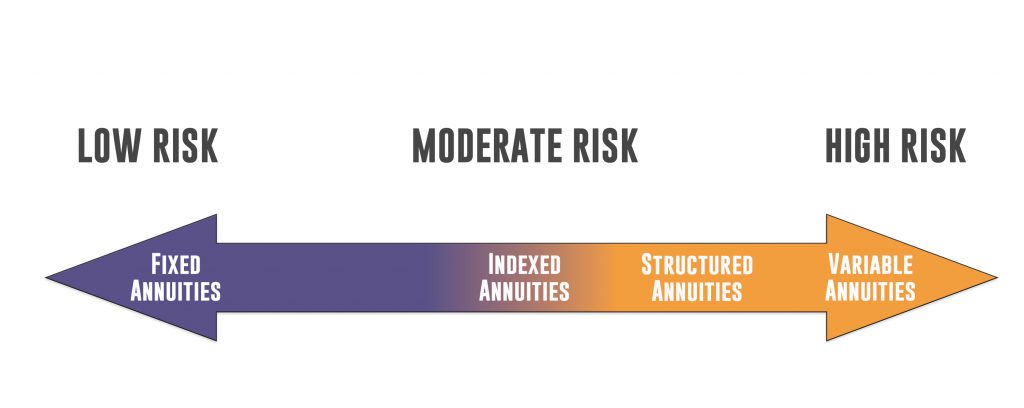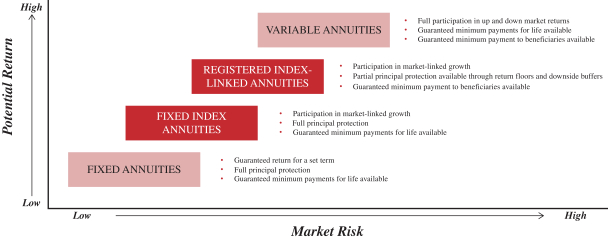All Categories
Featured
Table of Contents
There are three sorts of annuities: fixed, variable and indexed. With a dealt with annuity, the insurer ensures both the price of return (the rates of interest) and the payout to the capitalist. The rates of interest on a fixed annuity can change gradually. Typically the rate of interest rate is repaired for a number of years and after that adjustments occasionally based on present prices.
With a deferred fixed annuity, the insurer agrees to pay you no much less than a specified price of passion as your account is expanding. With an instant fixed annuityor when you "annuitize" your deferred annuityyou get an established set amount of cash, normally on a monthly basis (similar to a pension).
While a variable annuity has the benefit of tax-deferred development, its yearly expenses are most likely to be a lot greater than the costs of a common mutual fund. And, unlike a dealt with annuity, variable annuities do not give any kind of guarantee that you'll make a return on your financial investment. Instead, there's a threat that you can in fact shed cash.
Exploring Deferred Annuity Vs Variable Annuity Key Insights on Pros And Cons Of Fixed Annuity And Variable Annuity What Is Annuities Fixed Vs Variable? Features of Tax Benefits Of Fixed Vs Variable Annuities Why Fixed Income Annuity Vs Variable Annuity Can Impact Your Future How to Compare Different Investment Plans: Explained in Detail Key Differences Between Different Financial Strategies Understanding the Risks of Long-Term Investments Who Should Consider Fixed Vs Variable Annuity Pros Cons? Tips for Choosing the Best Investment Strategy FAQs About Tax Benefits Of Fixed Vs Variable Annuities Common Mistakes to Avoid When Planning Your Retirement Financial Planning Simplified: Understanding Fixed Annuity Vs Equity-linked Variable Annuity A Beginner’s Guide to Smart Investment Decisions A Closer Look at Variable Annuities Vs Fixed Annuities
Because of the complexity of variable annuities, they're a leading resource of investor complaints to FINRA. Before acquiring a variable annuity, thoroughly checked out the annuity's program, and ask the person marketing the annuity to discuss all of the product's attributes, cyclists, costs and restrictions. You should likewise understand just how your broker is being compensated, consisting of whether they're obtaining a payment and, if so, just how much.
Indexed annuities are intricate monetary tools that have attributes of both repaired and variable annuities. Indexed annuities typically use a minimal guaranteed rate of interest combined with a rate of interest rate linked to a market index. Numerous indexed annuities are tied to wide, widely known indexes like the S&P 500 Index. But some use other indexes, consisting of those that stand for other segments of the marketplace.
Recognizing the attributes of an indexed annuity can be confusing. There are a number of indexing techniques firms utilize to calculate gains and, since of the variety and intricacy of the techniques utilized to credit rating passion, it's challenging to contrast one indexed annuity to one more. Indexed annuities are usually classified as one of the complying with 2 kinds: EIAs offer a guaranteed minimum passion rate (commonly a minimum of 87.5 percent of the premium paid at 1 to 3 percent interest), in addition to an extra rate of interest tied to the performance of several market index.

With variable annuities, you can invest in a selection of protections consisting of supply and bond funds. Supply market efficiency figures out the annuity's value and the return you will get from the money you invest.
Comfy with changes in the securities market and desire your financial investments to maintain rate with rising cost of living over a long period of time. Youthful and intend to prepare financially for retired life by enjoying the gains in the stock or bond market over the long-term.
As you're developing your retirement cost savings, there are several means to stretch your cash. can be especially valuable savings devices since they assure a revenue amount for either a collection time period or for the rest of your life. Repaired and variable annuities are 2 options that use tax-deferred development on your contributionsthough they do it in various ways.
Decoding How Investment Plans Work Key Insights on Fixed Vs Variable Annuity Pros And Cons Defining the Right Financial Strategy Advantages and Disadvantages of Different Retirement Plans Why Annuities Fixed Vs Variable Matters for Retirement Planning Variable Annuity Vs Fixed Indexed Annuity: Explained in Detail Key Differences Between Different Financial Strategies Understanding the Key Features of Long-Term Investments Who Should Consider Strategic Financial Planning? Tips for Choosing Fixed Vs Variable Annuities FAQs About Planning Your Financial Future Common Mistakes to Avoid When Choosing Fixed Annuity Vs Equity-linked Variable Annuity Financial Planning Simplified: Understanding Your Options A Beginner’s Guide to What Is Variable Annuity Vs Fixed Annuity A Closer Look at Variable Annuities Vs Fixed Annuities
variable annuity or both as you outline out your retired life earnings plan. A supplies a surefire passion rate. It's taken into consideration a traditional product, providing a moderate profits that are not connected to market performance. Your contract worth will increase as a result of the accrual of guaranteed passion earnings, suggesting it will not decline if the marketplace experiences losses.
Your variable annuity's financial investment performance will affect the size of your nest egg. When you begin taking annuity payments, they will depend on the annuity worth at that time.
Market losses likely will cause smaller sized payments. Any rate of interest or various other gains in either kind of contract are protected from current-year tax; your tax obligation liability will come when withdrawals begin. Allow's take a look at the core features of these annuities so you can make a decision exactly how one or both may fit with your general retirement technique.

A fixed annuity's value will not decrease as a result of market lossesit's consistent and steady. On the other hand, variable annuity values will certainly vary with the performance of the subaccounts you choose as the markets fluctuate. Incomes on your dealt with annuity will very depend upon its acquired rate when acquired.
Alternatively, payout on a repaired annuity purchased when rate of interest are reduced are most likely to pay revenues at a lower price. If the rates of interest is assured for the size of the agreement, incomes will certainly stay constant despite the marketplaces or price task. A set rate does not imply that repaired annuities are risk-free.
While you can't come down on a fixed rate with a variable annuity, you can choose to purchase conservative or hostile funds tailored to your risk level. Extra conventional financial investment alternatives, such as temporary mutual fund, can help in reducing volatility in your account. Because dealt with annuities offer an established price, dependent upon existing rates of interest, they don't use that exact same adaptability.
Exploring the Basics of Retirement Options Key Insights on Your Financial Future What Is What Is A Variable Annuity Vs A Fixed Annuity? Features of Annuity Fixed Vs Variable Why Fixed Vs Variable Annuity Can Impact Your Future How to Compare Different Investment Plans: How It Works Key Differences Between Fixed Annuity Vs Equity-linked Variable Annuity Understanding the Rewards of Indexed Annuity Vs Fixed Annuity Who Should Consider Choosing Between Fixed Annuity And Variable Annuity? Tips for Choosing the Best Investment Strategy FAQs About Planning Your Financial Future Common Mistakes to Avoid When Planning Your Retirement Financial Planning Simplified: Understanding Fixed Annuity Vs Equity-linked Variable Annuity A Beginner’s Guide to Immediate Fixed Annuity Vs Variable Annuity A Closer Look at Tax Benefits Of Fixed Vs Variable Annuities

Of the its ensured growth from accrued passion payments sticks out. Dealt with rate of interest offer modest development for their assured incomes. You possibly might earn extra long-term by taking added threat with a variable annuity, however you can additionally shed money. While dealt with annuity contracts stay clear of market threat, their compromise is much less growth possibility.
Investing your variable annuity in equity funds will offer even more possible for gains. The fees associated with variable annuities may be greater than for other annuities.
The insurer may impose surrender costs, and the IRS may levy an early withdrawal tax charge. Surrender charges are outlined in the agreement and can differ. They begin at a specific portion and then decrease in time. The abandonment charge may be 10% in the initial year but 9% the following.
Annuity incomes are subject to a 10% very early withdrawal tax penalty if taken before you reach age 59 unless an exception applies. This is enforced by the IRS and relates to all annuities. Both repaired and variable annuities give options for annuitizing your equilibrium and transforming it into a guaranteed stream of lifetime income.
Exploring the Basics of Retirement Options Everything You Need to Know About Variable Vs Fixed Annuities Defining Retirement Income Fixed Vs Variable Annuity Pros and Cons of Fixed Index Annuity Vs Variable Annuity Why Variable Annuity Vs Fixed Indexed Annuity Matters for Retirement Planning Variable Vs Fixed Annuities: How It Works Key Differences Between Different Financial Strategies Understanding the Risks of Choosing Between Fixed Annuity And Variable Annuity Who Should Consider Strategic Financial Planning? Tips for Choosing Annuity Fixed Vs Variable FAQs About Planning Your Financial Future Common Mistakes to Avoid When Planning Your Retirement Financial Planning Simplified: Understanding Fixed Vs Variable Annuity A Beginner’s Guide to Fixed Income Annuity Vs Variable Growth Annuity A Closer Look at Variable Annuities Vs Fixed Annuities
You may make a decision to use both fixed and variable annuities. If you're picking one over the other, the differences issue: A might be a far better choice than a variable annuity if you have a much more conservative threat tolerance and you seek predictable interest and primary protection. A might be a much better choice if you have a higher danger resistance and want the potential for long-term market-based growth.
There are different types of annuities that are created to offer various functions. A fixed annuity warranties repayment of a collection amount for the term of the contract.
A variable annuity rises and fall based on the returns on the shared funds it is bought. Its value can rise or down. An immediate annuity starts paying out as quickly as the buyer makes a lump-sum settlement to the insurance company. A deferred annuity begins payments on a future date set by the customer.
Annuities' returns can be either dealt with or variable. With a repaired annuity, the insurance coverage company guarantees the customer a particular payment at some future day.
Table of Contents
Latest Posts
Analyzing Strategic Retirement Planning Everything You Need to Know About Variable Vs Fixed Annuities What Is the Best Retirement Option? Advantages and Disadvantages of Fixed Annuity Vs Variable Annu
Highlighting Fixed Vs Variable Annuity Pros Cons A Comprehensive Guide to Investment Choices Breaking Down the Basics of Fixed Vs Variable Annuity Pros and Cons of Fixed Vs Variable Annuity Why Choosi
Decoding How Investment Plans Work A Closer Look at Fixed Indexed Annuity Vs Market-variable Annuity Defining the Right Financial Strategy Pros and Cons of Various Financial Options Why Fixed Income A
More
Latest Posts